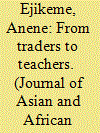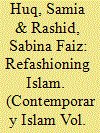| Srl | Item |
| 1 |
ID:
106370


|
|
|
|
|
| Publication |
2011.
|
| Summary/Abstract |
In Onitsha, an important commercial center in Nigeria, success as a merchant was the usual route for women who aspired to elite status in the period before the 1930s. In 1928, a school for girls was opened by the Holy Rosary Sisters, a Catholic order created especially by the bishop in charge of Onitsha Diocese. The opening of this convent school in Onitsha heralded a major transformation in the lives of Onitsha women, marking the transition between two epochs with regard to how women achieved elite status. From the mid-1930s a new class of elite women began to appear in Onitsha, all products of mission education; this transition from traders to teachers marks a major shift in the lives and roles of elite women. The colonial government contributed to this transformation with policies that undermined women's ascendancy in the market by placing men in leadership positions there.
|
|
|
|
|
|
|
|
|
|
|
|
|
|
|
|
| 2 |
ID:
081749


|
|
|
|
|
| Publication |
2008.
|
| Summary/Abstract |
This paper attempts to explore the development of Islamic identity of a group of elite women in Dhaka, Bangladesh. These women constitute a significant group in the country where 10% of the rich control 40% of the national wealth, and the 10% of the poorest control 1.84% of the national wealth.* Socially, politically and economically, elite women and their families are powerful and have access to resources and political influence. Many of these women who did not grow up with a very strict religious orientation came to Islam and consolidated religious thoughts and practices through a weekly Quran reading class. This particular Quran class began in 2002. The classes were initiated by a foreign diplomat's wife who was Muslim, and have continued even after her departure from the country in 2004. While Dhaka houses many meetings of Muslim men and women to discuss Islamic ideas and practices, this particular class was quite unique in its ability to attract and convert elite women whose lives were seemingly perfect. This urban elite phenomenon of Islamic revivalism has not been the subject of any in-depth research in Bangladesh, and this work therefore, is the first of its kind and largely introductory
|
|
|
|
|
|
|
|
|
|
|
|
|
|
|
|